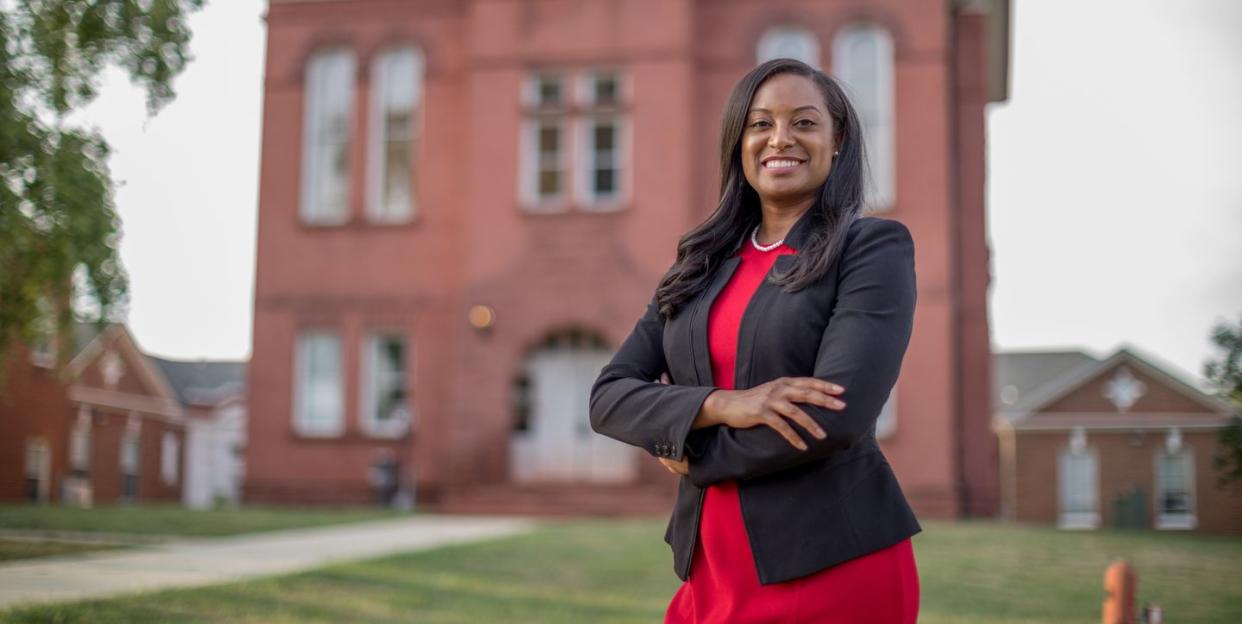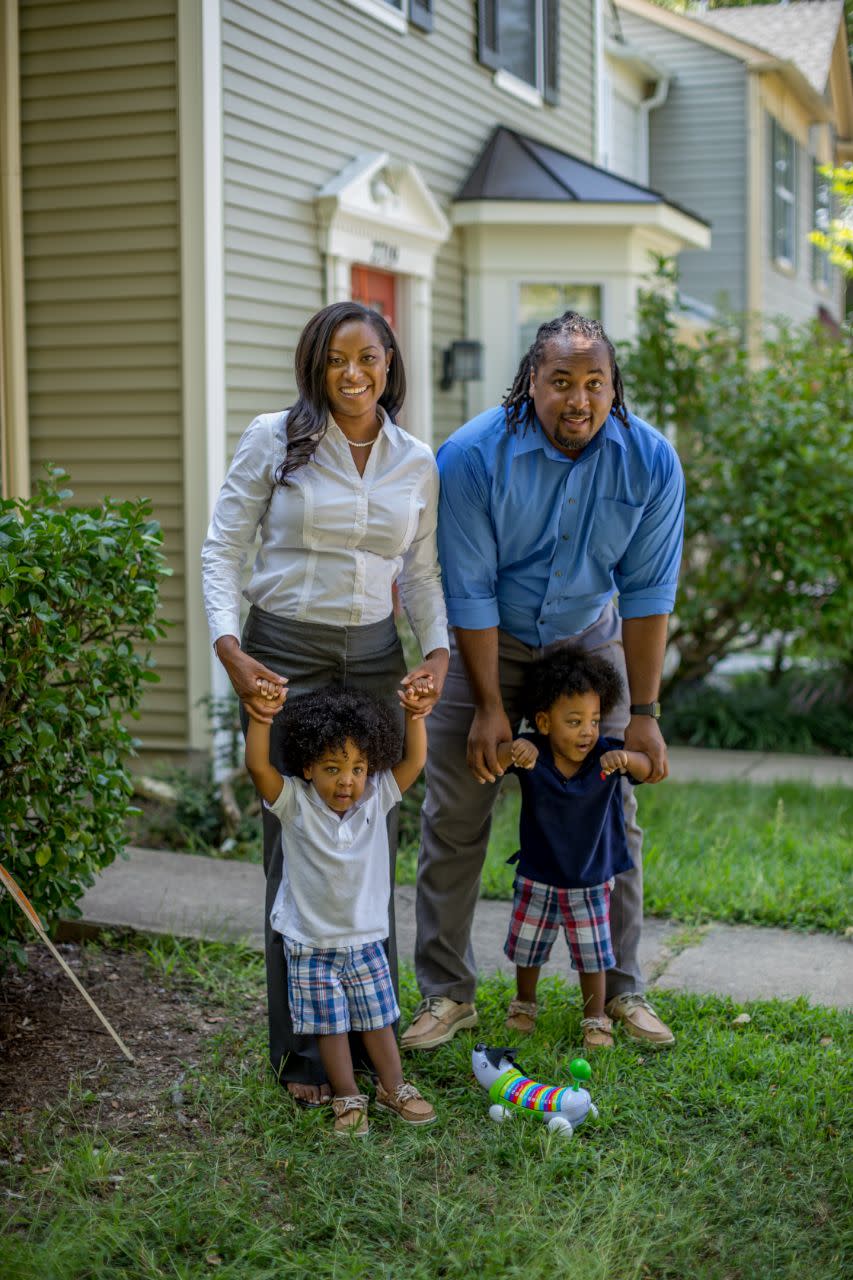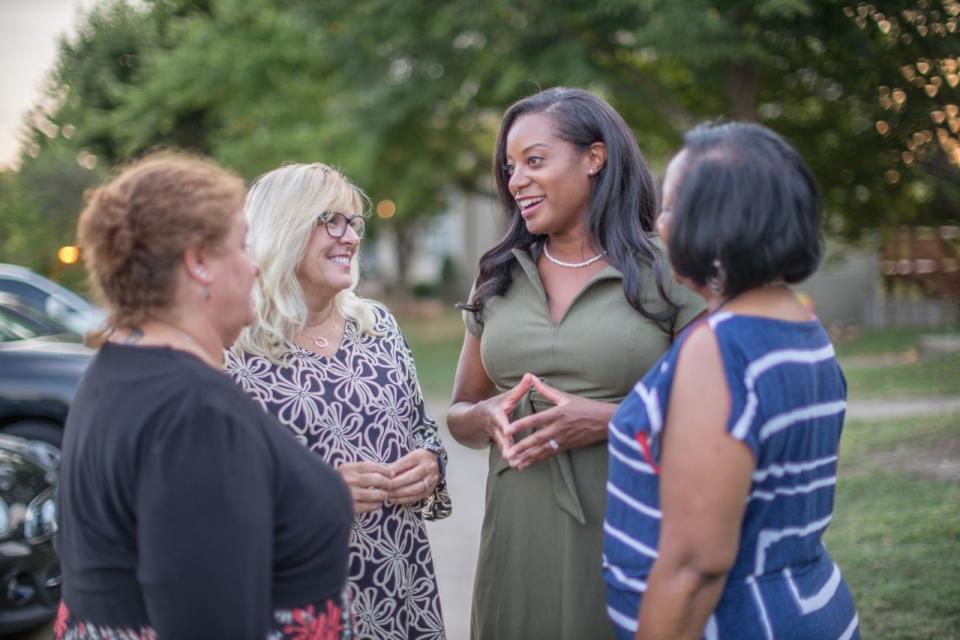Jennifer Carroll Foy Wants to Be the First Black Woman Governor in America

In January, Jennifer Carroll Foy helped end nearly 50 years of inaction on the Equal Rights Amendment by leading a push to make Virginia the final state needed to ratify the landmark women’s rights legislation to the Constitution. Today, the 38 year old freshman state delegate and criminal defense attorney took on an entirely new, historic challenge, announcing she is running to become the next governor of Virginia.
Carroll Foy is the first black woman to run for statewide office in Virginia, and if elected, she would be the first black woman governor in the country. (She may not be alone in this historic moment—Democratic State Senator Jennifer McClellan, who is also a black woman, has also signaled plans to run for governor in 2021). But just three years ago, when she mounted her first campaign against a well-funded, deeply entrenched white Republican opponent for a seat vacated by another white Republican man, none of this seemed possible.
“When I decided to run, a handful of political people down in Richmond told me ‘no,' they had their candidate. They figured flipping a Republican seat is really hard and I needed to wait my turn,” she told ELLE.com. Carroll Foy, who ran her campaign while pregnant with twins, went on to beat Michael Makee in a landslide.
Democrats now run Virginia’s state government for the first time in more than 20 years, an apparent rebuke of Donald Trump, who, according to former Gov. Terry McAuliffe, has been “the single biggest driver to the Democratic Party of Virginia.” Carroll Foy was among the record 28 women elected to the House of Delegates in 2017 and is emboldened by the “wave of new Democratic leadership happening across the Commonwealth and across the country,” noting that in her state, “women are successfully leading the charge.” Indeed, the Washington Post dubbed 2020 Virginia’s “Year of the Woman,” in which Eileen Robin Filler-Corn, the state’s first female Speaker of the House, and Charniele Herring, the first female majority leader, have helped “drive passage of the most ambitious, far-reaching package of liberal legislation of any session in memory.”
“Now, after watching me win my race, serve in the House of Delegates, pass laws and help win the Democratic majority back, those folks don’t talk like that anymore,” Carroll Foy said of those who dismissed her. “Now they see women like me as pushing the conversations we need to have….and I know that many of those people are now happy that I ran."
She had originally planned to launch her campaign in March, but postponed due to the coronavirus pandemic. Instead of door-knocking and holding in-person town halls, her campaign has shifted to digital outreach, and she manages a campaign while working two jobs and homeschooling her children with her husband.
Carroll Foy is responsible for shepherding several groundbreaking bills, including one that aims to reduce the disproportionate maternal mortality rate among black women, legislation that tackles pregnancy discrimination, a dress code equity act to protect girls and women of color from discrimination based on their hairstyle or headdress, and a push for insurance companies to cover donated breast milk. She emphasized why the ERA matters for women of color: “It’s my job to champion this important policy, this resolution to say it affects women and men in general, but it affects women of color specifically,” she told Jezebel in January. “And that’s because we suffer the gravest impact from inequality in pay.”
The coronavirus has also laid bare the gaping holes in America’s social safety net and exacerbated racial disparities—a disproportionate number of people dying from the virus are black. In Virginia, black and Hispanic people make up at least 46 percent of the state’s cases, and 40 percent of the state’s essential workers are people of color. Yet even as Virginia saw its first cases of coronavirus in early March, the state failed to pass protections like paid sick leave, and earlier this month, Virginia’s Democratic Gov. Ralph Northam authorized the first phase of reopening businesses.
Carroll Foy, who introduced a separate, more expansive paid sick leave bill last year, wrote a letter to Northam highlighting the urgent need for such legislation and is among the signatories on a letter from Virginia’s Black Legislative Caucus warning him that reopening will further endanger black and brown communities. “Under the current plan, and with the already existent racial disparities that this pandemic and economic crisis are perpetuating,” the letter reads, “we will be creating a situation where Black and Brown Virginians outside of Northern Virginia will become guinea pigs for our economy.” She supports rising movements calling to cancel rent and student loan debt during the pandemic, and supports a House Democratic bill that would give millions of Americans a universal basic income over the next several months.
“We see how much people need, and could use, 14 days of paid leave to care for themselves if they are suffering from symptoms of COVID-19, or to care for a child or a loved one,” she told ELLE.com
Her political priorities are in part a reflection of her experiences growing up in Petersburg, VA, a former manufacturing town where nearly one-third of residents live at or below the poverty line, and a majority are black. “Me being from Petersburg has informed a lot of the policies that I carry and that I care about,” she said. “There are a lot of communities in the Commonwealth just like Petersburg. Communities that have been neglected, ignored, and left behind.”

She was raised by her grandmother, a “strong, powerful, and very regal” woman who sent Carroll Foy to church three days a week. “I remember at a very young age, after she had a stroke and became a quadripelegic, sitting at the dining room table with my aunt, trying to decide whether we’re going to pay for our mortgage that month or whether we’re going to pay for the medications keeping my grandmother alive.” Despite the family’s struggles, her grandmother taught Carroll Foy to open up her blessings to others: “That if I had it, that I had to give it.”
“That’s why I dedicated my life to public service,” she said.
She also made it a point to break up the boys club. As a high school student, she remembers watching Supreme Court Justice Ruth Bader Ginsburg deliver the Supreme Court’s opinion on the Virginia Military Institute, a public military school, which had barred women applicants. “At the time, I didn’t know that I was relegated to a second-class citizen because I was a woman. That there were colleges in the country that I couldn’t go to just because I was female,” she recalled. “The men in my class, they said things like, ‘Women shouldn’t be allowed to go to VMI because we are biologically inferior, mentally and physically….and called women a distraction to men.” At that moment, Carroll Foy decided to apply to the school because “I was just as strong, as powerful, as capable as any man in that classroom.” She received a men’s uniform, but in 2003, she proved her male colleagues wrong and became one of the first black women to graduate. (Northam is also a VMI alum.)
“I was willing to sacrifice my safety, my time, my college experience, because women were not treated equally, and I wanted to do something about it. And I wanted to prove true what Supreme Court Justice Ruth Ginsburg said—and I’m paraphrasing—that women can do all things if given the opportunity,” she said.
After graduating, Carroll Foy sought a master’s degree in English from Virginia State University, a historically black college where she briefly taught before going to law school in San Diego. She became a litigation associate but felt unfulfilled, and returned to Virginia where she became a magistrate judicial official, where she administered search and arrest warrants. The role exposed her to how a person’s class, zip code, and race made them unequal targets of the law, which prompted her to instead become a public defender, where she represented people more than 100 percent under the poverty line.
While her perspective, experience, and policy record make her a compelling candidate, she especially stands out when considering her likely opponents, which include two men embroiled in controversy. After media outlets reported that Northam (who is ineligible for re-election) appeared in a medical school yearbook photo where one person was in blackface and another wore KKK garb, Virginia Attorney General Mark Herring, who has said he will run for governor next year, admitted that he also wore blackface in college. Virginia Lt. Gov. Justin Fairfax, who has alsoannounced plans to run, was accused of sexual assault by two women. (Fairfax has strongly denied the accusations and filed a defamation lawsuit against CBS. A judge tossed the lawsuit in February.)
Carroll Foy did not directly address whether she believes that either of these offenses should disqualify Herring or Fairfax from being effective leaders, but suggested that the controversies highlight existing issues and the work that’s left to do. “For far too long, survivors of sexual assault and harassment haven't been believed, and they need to be taken very seriously because these are serious allegations,” she said. “Part of what I hope to do as governor is to help create a culture where women are treated as equals and promote a culture where women are trusted and women are believed.”
Of Herring and Northam’s admissions, she said: “That issue has caused good and uncomfortable conversations about race and reconciliation here in Virginia. I try to look at everything as an opportunity to grow and an opportunity to make amends.” Citing legislation that tackles Jim Crow-era barriers, such as the bill moving through the legislature that will allow localities to decide what to do with Confederate monuments, she said, “We've taken a proactive approach with a lot of these controversies...it has made more people more aware of systemic racism and implicit bias and I think everyone has just really doubled down on trying to address a lot of these issues.”

But if Trump is re-elected, Carroll Foy will have to decide how far she’s willing to go to push back against institutional bias. The Trump administration has punished blue states, threatening to pull healthcare funding, limiting tax cuts, and striking back at states like New York for maintaining sanctuary cities that protect undocumented immigrants—even during the pandemic.
“I don't have to make the pitch about how important governorships are, now,” she said. “Because with the failure of federal government, people see how governors are the backstop from potentially millions of people dying and there being total and complete chaos.”
Even as Joe Biden has appeared to tack left in response to the coronavirus, considering that Virginians decisively voted for the centrist over progressive firebrand Bernie Sanders in its Super Tuesday primary, the next governor is likely to walk a careful line with the party’s progressive wing. Carroll Foy, who endorsed Biden, is not advocating for a healthcare overhaul in the form of universal healthcare, but instead seeks to make the existing system more affordable by lowering premiums, increasing coverage, and lowering copays. She is “not just a Democrat’s delegate,” she said. “I try to meet people where they are, and try to listen.”
“I decided that now was the time when I saw that there were so many politicians that were completely out of touch with Virginians. There is still a stronghold by special interest groups in Richmond, and it’s stifling our ability to reach our full potential,” she said of her historic campaign. “This is the right time to run, because I’m the right leader for this moment.”
You Might Also Like
